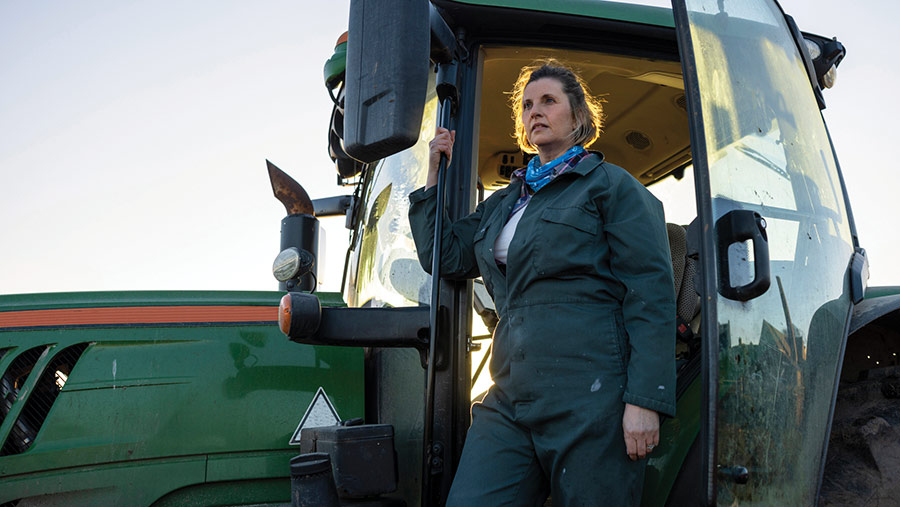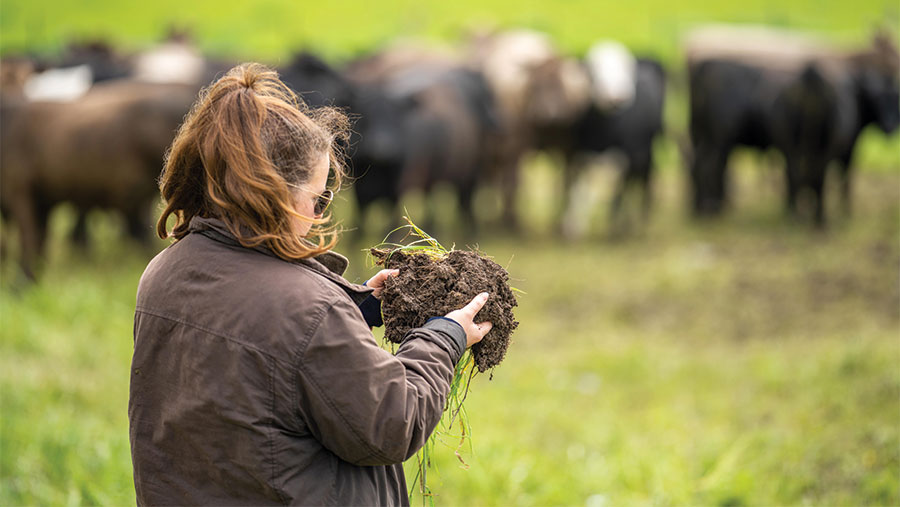Why don’t women own farmland and does it matter?
 © iStockphoto.com/SolStoc
© iStockphoto.com/SolStoc Who owns the UK’s farmland? Answering this question is more difficult than you might imagine, with data either closed to the public or not gathered in the first place.
And finding out how much of that land is owned by women is equally hard, though researchers believe it to be a very low proportion.
Farmers Weekly’s recent survey on the role of women in agriculture found men were far more likely to have entered the industry as an owner/occupier or part of a family partnership/company than women (38% versus 18%).
Women, meanwhile, were more likely than men to have entered the industry through marriage (19% versus 1%).
See also: Women can be the ‘glue’ that holds a farm together
In England, Defra attempted to gather some data on the number of female principle farmers and holders through its Farm Business Survey in 2023, and found just 12% were women.
Women’s share of farmland overall across Europe is also believed to be lower, because they typically own smaller holdings.
No information on the sex of landowners has been collected in Scotland or Wales.
‘Ingrained’
Sally Shortall, Duke of Northumberland professor of rural economy at Newcastle University, suggests this is an issue “everyone is afraid to touch”.
“Land is culturally passed from father to son, and that’s very ingrained. It’s almost like farming is a pre-industrial industry,” she says. “Governments should be measuring it more accurately.”
Professor of sustainable agri-food systems Louise Manning, at Lincoln University, has co-authored an overview of UK farm women in academic literature, and explains there is a historical element to the issue.
“If you look at women’s property rights and their rights to vote, all of those have come almost in living memory. We’re still in that first iteration of women’s rights,” she says.
“There is a real challenge with farms in that – you need an awful lot of capital to be able to run a farm and if you dilute that capital too much, you then lose the asset you can borrow money against.
“So what’s tended to happen is that capital has been retained in one block, which is then passed father to son. That has meant women have not been able to access that property, as we’re seeing.”

© Adobe Stock
Ownership
Despite this situation, there has been very little discussion about female land ownership in the UK.
Instead, the global conversation has focused on the importance of women in developing countries owning land, with research showing they spend the returns in ways which benefit the wider community, such as on children’s education or nutrition.
But multiple studies in Europe show access to land still represents the single largest barrier to women’s entry and participation in agriculture.
That access to land facilitates access to other resources including capital, infrastructure, training and networks.
Arable farmer Eleanor Hay, who inherited land from her father in Suffolk, says: “I’ve always been very much involved in women in agriculture and really pushing us forward, but I’ve never thought about it from the angle of the actual land ownership.
“We’ve been so focused on getting women shown as the face of farming, but we haven’t thought about the nuts and bolts of who’s actually owning it. It’s an important conversation to have.”
A matter of finance
A recent British Business Bank small and medium-sized enterprise finance report has shown that women are more reluctant to take advantage of finance to grow their business than men.
The willingness to use it among female-led businesses stands at 25%, compared to 35% of male-led businesses.
Female-led businesses also face lower approval rates, with 72% of women-led businesses obtaining funding in 2023, compared to 79% of male-led businesses.
Lloyds Bank’s relationship director for agriculture, Victoria Read, believes women in farming may lack the confidence to apply for finance.
This is illustrated by Farmers Weekly’s own recent research, which found 45% of women felt their influence on farm was held back by a lack of self-confidence. Just 13% of men said the same.
Ms Read believes the increasing number of women working in the banking sector will improve this situation.
“Twenty-five per cent of our relationship managers are female and that’s really important, because having a strong support network around women in agricultural businesses helps us support them,” she says.
But Prof Sally Shortall suggests there may be an issue around the type of financial support that’s made available to farms, as usually banks tend to favour big investments and big machinery.
“Women often want smaller investments. They might want smaller bits of equipment, so they cannot be viewed as favourably.”
Succession
For Prof Louise Manning, a lack of confidence among women may also be having an impact on their ability to begin or participate in succession discussions.
“One thing the government could do is take some of their Defra facilitation funding and focus it specifically on mechanisms for improving succession,” she says.
“That would help for tenants too, when we’re seeing three-generational tenants moved to five-year business tenancies and all the difficulties that sit around that.”
Management
That said, Prof Manning is keen to point out that women are playing an increasingly important role in how land is managed, despite not necessarily owning it.
“In terms of women engaging and having decision-making roles in agriculture, there is a bottom-up change that’s occurring that we probably don’t see in the statistics,” she says.
Prof Manning adds that there are a huge number of female land agents who are also having a massive influence, again without legally owning land.
But a second-year agriculture and animal sciences student at Aberystwyth University, Hattie Bryett, sees things differently.
“Having control over what you’re doing and being able to own it is important,” she says.
“I think it’s sad people are telling themselves in their heads they don’t have to own the land. If you’re working really hard on something, you want that jurisdiction.
“You don’t want someone to just be able to change their mind. I know we have contracts, but let’s be honest, contracts aren’t always fully binding, and there’s always a loophole somewhere.”
Carbon trading
Questions around land ownership are also set to become even more important in an era when policies around carbon trading, biodiversity net gain and nutrient neutrality are being established.
“Who owns the land then does matter, both in terms of the benefits, but also the liabilities,” says Prof Manning.
“If we look at some of these potential biodiversity covenants going forward, how will they affect property rights? I don’t think any of us know. But who owns the land then may have an impact.”
Ms Hay also suggests legally owning land gives her a “stronger voice” in meetings with people outside the business.
“Now I am officially a landowner, when I come in as a woman I have a bit more gravitas than previously just being the farm manager,” she says. “It definitely helps to have a seat at the table.”
Policy steps
In Scotland, the government has taken a number of steps to support women in agriculture, including giving preference to women when land from the Forestry Commission came up for rent.
The EU has also stipulated that member states must have incentives to increase representation for women in agriculture as part of its CAP plans, and for the next round of CAP, some are looking at how women access finance.
Tenancies and partnerships – a changing picture
Tenant Farmers Association chief executive George Dunn believes women face particular difficulties accessing tenancies, as well as land ownership.
“It is the case that estates are still very conservative in their approach and take a very male-dominated view when letting tenancies,” he says.
“This includes situations where husbands and wives or life partners are farming together as a business, but where tenancies are put only into the name of the males.
Rightly, this is changing and we are seeing more landlords being prepared to grant joint agreements in these circumstances.
“More widely, we are seeing many more females coming into the tenanted sector, but I would say that it is still tremendously tough going for them in comparison to their male counterparts.”
Though the situation with land ownership will not change overnight, there is optimism that things will improve over the coming decades.
“With many of my students that are female, when they have gone back home after being at university, they are farming partners within the farming businesses,” says Prof Louise Manning.
“So in the generation that’s out there now, that’s 25 to 35, we’re seeing a difference in capital accumulation for women. I think it’s just a matter of time before you see it going right through the sector.”
Level The Field
Huge strides forward have already been made for women in farming over the past few decades, but problems still remain, such as:
- Low land ownership rates among women
- Resulting difficulty in accessing private finance or government support
- Difficulties in using equipment/work clothing/on-site facilities designed for men
- Lack of access to flexible working for childcare or other family needs
- Low representation in representative farming organisations at the highest levels
- Being overlooked for succession
- Being subjected to prejudice either on farm or at farming events.
Level the Field will seek to shine a light on these problems and offer solutions to them.
The main part of the campaign will centre on practical support for farm business owners – both men and women.
See more on our Level the Field page.
